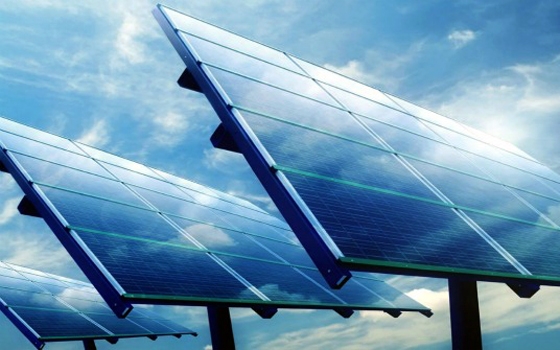German scientists produced some remarkable research earlier this year. They published a report which said that a solar panel farm that covered the relatively small area of 254 sq. kilometers, would in theory meet the electricity needs of the entire world.
There are of course all sorts of practical difficulties to such a single solar power station. Degradation of current during transmission and the need for some sort of overnight energy storage are two obvious challenges. But this research serves to underline a principle which only now thanks to breakthroughs in photovoltaics, could turn into a substantial reality.
The Kingdom has been to the fore in research in solar panels. Since 2009 the King Abdul Aziz City for Science and Technology (KACST) has been working with IBM on advanced photovoltaics. The first fruits of that research are now being seen with the development of solar power desalination plants. Two pilot operations on either coast at Al-Khafji and Rabigh are pointing the way to the wholesale replacement of fossil-fueled water-making facilities.
Moreover, the Kingdom’s planners clearly anticipated the German research. The King Abdullah City for Atomic and Renewable Energy (KACARE) is building five solar power stations on behalf of the Saudi Electricity Company. The projects are at Qaisomah (Eastern Province), Rafha (Northern Borders), Wadi Al-Dawaser (Riyadh), Mahd Al-Dahab (Madinah) and Sharourah (Najran). The first solar station should be finished by the end of next year with the first electricity flowing by early 2016.
KACARE is also committed to the establishment of nuclear power stations. Theoretically fossil-fueled generation could eventually be phased out in the Kingdom. With it would go the inevitable environmental damage of current power production.
There is however a problem with the optimistic forecasts of abundant, recyclable energy for desalination and generating power for the economy as a whole. They will do nothing to cause Saudis to cut back on what is the among the highest per capita power consumption in the world. Nor will it persuade Saudis to reduce their profligate use of water, once one of the Kingdom’s most precious and treasured resources.
There is of course the argument that the sheer massive potential of solar power means that there need be no concerns about conserving energy. The scale of Saudi Arabia’s hydrocarbon resources encouraged a similar analysis; there was no need to be concerned about harboring such an abundant resource. Other countries around the world may need to cut back on consumption because of high costs and environmental concerns. The Kingdom need have no such worries.
Yet, it has long been warned that domestic power and fuel demand was taking up an ever-greater proportion of oil and gas production. Planners are saying that on current growth trends, the day is not far off when the Kingdom consumes more oil and gas than it actually sells abroad.
Yet the emergence of solar-generated power will take the sting out of all these cautionary announcements. Hydrocarbon reserves are finite and come with an environmental cost. Solar power is infinite and is the ultimate environmentally-friendly fuel.
Are those who say that we should use our advantages to the full actually right? Why should the current price of Saudi power or water be edged up even to cover the real cost of production, let alone to anything approaching international prices? Cheap power and water give a strong competitive advantage. Why should this not be exploited to the full?
Well actually No. It may be counterintuitive, but there are real costs to cheap inputs. Any business around the world that benefits from low costs at any point in the production process may enjoy a competitive edge, but is not automatically itself competitive. Indeed if executives have life made too easy for them, they can lose rigor and imagination.
Financial discipline is undermined by siren reasoning. Since a business is saving so much money on its power and water, it can afford to be less particular over its expenditure elsewhere.
The most successful businesses around the world, are now on a permanent mission to drive out costs, wherever they arise. Their view is that a saving in one part of the company is no saving at all, if there are not similar savings elsewhere. The tightest-run corporate ship is the one that sails fastest and furthest.
Since the Kingdom joined the World Trade Organization, leading Saudi companies have gone a long way to meet exacting international standards. The same hard-headed business approach that they have adopted must be applied to our upcoming renewable energy sources.
Arab News
9 November








































































